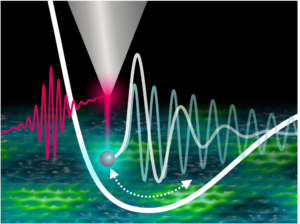News Reports
Oct 2022

The functionality of a material and its macroscopic response to external stimuli are dictated by the microscopic interactions of its elementary degrees of freedom – electrons, lattice, and spin. Understanding the fundamental mechanisms and complex many-body interactions that determine relevant material properties is a main goal of modern solid state research. In spatially inhomogeneous crystals, atomic-scale variations of the crystal lattice and/or its electronic structure will alter the microscopic response – may it be due to imperfection [more...]
Dr. Melanie Müller: m.mueller@fhi.mpg.de
Jul 2022

Sebastian Maehrlein, leader of the “THz Structural Dynamics” group, has been awarded an independent Emmy Noether group by the German Research Foundation (DFG) for a funding period of 6 years. His research focus will be centered on actively steering lattice angular momentum in solids for ultrafast control of material properties.
Even though exchange of energy and linear momentum between lattice vibrations (phonons) and other degrees of freedom is a cornerstone of solid-state physics, phonon angular momentum is commonly just assumed to account for angular momentum conservation [more...]
Even though exchange of energy and linear momentum between lattice vibrations (phonons) and other degrees of freedom is a cornerstone of solid-state physics, phonon angular momentum is commonly just assumed to account for angular momentum conservation [more...]
Dr. Sebastian Maehrlein: maehrlein@fhi-berlin.mpg.de